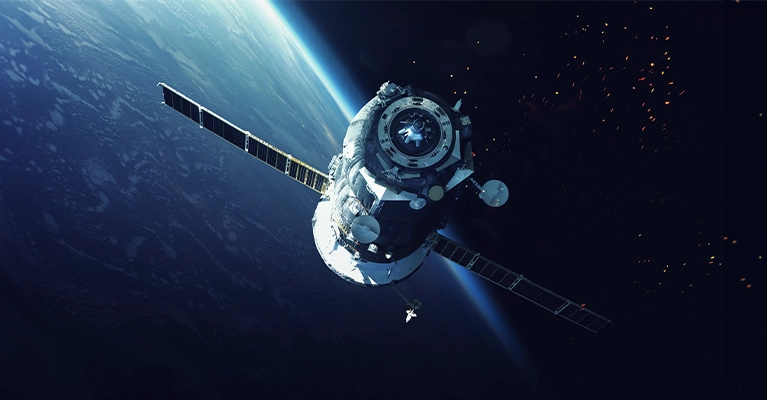
ONLINE COURSE
New Space Economy:
Why enroll in this course?
Investigate case studies employing an industry and systems engineering perspective for the development of new space products and services.
Develop new business opportunities involving New Space technologies while understanding the impact that the space industry has on non-space-related ventures.
Identify key trends and potential implications for future advancement in space technology and exploration by analyzing the space sector's most important innovations.

Engage in two live sessions with MIT instructors, and up to eight live sessions with learning facilitators, industry experts, and peers.

Networking opportunities establish professional connections with industry experts and your cohort.

Access to rich supplementary resources provides additional materials and content for a more thorough educational journey.

Certificate
All the participants who successfully complete their program will receive an MIT Professional Education Certificate of Completion, as well as Continuing Education Units (CEUs)*.
To obtain CEUs, complete the accreditation confirmation, which is available at the end of the course. CEUs are calculated for each course based on the number of learning hours.
*The Continuing Education Unit (CEU) is defined as 10 contact hours of ongoing learning to indicate the amount of time they have devoted to a non-credit/non-degree professional development program. To understand whether or not these CEUs may be applied toward professional certification, licensing requirements, or other required training or continuing education hours, please consult your training department or licensing authority directly.
Course outline
The New Space Economy is global, entrepreneurial, and, most importantly, accessible. It is increasingly diversified and expanding with private players across a variety of sub-sectors. There is a truly astronomical growth in funding and investing. This has been made possible because the New Space Economy is finally connecting to the global economy.
Definition of New Space and the New Space economy
How has New Space impacted our society?
What Are the Future Opportunities for New Space Development?
What Challenges Are Associated with the Evolution of New Space?
Case study: The Rise of SpaceX, Blue Origin, and Others in the New Space Economy
The Space Race (1957-1980s)
The International Collaboration Era (1980s-2000s)
Commercial Space: NASA’s COTS Course (2006-2013)
New Space: First Private Investments in the Space Sector (2013-today)
Space going forward (2022-beyond)
Case Study: The Role of Space Agencies in Fostering the Private Space Sector
Space Mission Value Chain Overview
Upstream Segment
Midstream Segment
Downstream Segment
Vertical Integration: Challenges and Opportunities
Example: Comparing New Space Mission and Traditional Space Mission Value Chains
Comparison of Government Earth Observation (Copernicus incl. Sentinel) vs. Planet (Doves, Skysat)
New Space Stakeholder Analysis
New Space Vs. Traditional Space: Key Analogies and Differences
Case study: Planet Constellation Vs. Copernicus for Earth Observation
Product Development Lifecycles
Design for Performance Vs. Design for Cost Vs. Design for End-User Needs
“One off” Vs. Iterative Development Cycles
Technology Insertion and Technology Risk Management
Launch Industry Innovation (Rocket Lab, Astra, Virgin Galactic)
Waterfall Development Process
Systems Engineering Vee-Model
Agile Development Processes
Configuration Management
Technical Valuation of Development Processes
Example: Prof. de Weck’s CSTR Roadmap: Planet Agile (Interview with Matt Ferrao)
Service Systems Architecture
Traditional Business Models
Innovative Business Models
Service and Business Model Valuation
CSTR Roadmap Example: Telecommunications Overview of Space as a Service (SaaS) business proposition
Funding Mechanisms of New Space Ventures
Institutional Funding
Private Funding: Venture Capital and Private Equity
Role of Capital Markets: SPACs and IPOs
Case Study: What Do VCs Think About New Space? Interviews with Investors
Case Study: The Role of Space Agencies in Fostering the Private Space Sector
New Space Opportunities and Challenges
Environmental Concerns of New Space; Orbital Debris and Mitigation Efforts
End-to-end Systems Analysis of Space Mission Environmental Sustainability; United Nations Space Sustainability Ratings
Interviews with Prof. Danielle Wood and Prof. Moriba Jahi E
Case Study: Towards a Sustainable, Circular New Space Economy
Who is this online course for?
Engineers who want to understand the key engineering drivers for New Space products and technologies.
Engineering managers interested in analyzing New Space products and technologies from a systems engineering perspective, and how they compare with traditional space analogs.
Entrepreneurs wanting to determine what future opportunities exist in the development of New Space.
Investors who desire to understand the key differences between New Space and traditional space from the perspective of stakeholders and their needs, as well as from a technology, product, service, and business model standpoint.
Participants wanting to understand the key innovations in products, services, technologies, and business models in shaping the New Space economy.
Instructors

Professor in Space Technology

Professor of Aeronautics and Astronautics and Engineering Systems, MIT
MIT Professional Education in Numbers
+60K
+155
92%
Frequently Asked Questions
Applicable taxes will be calculated and added at checkout in accordance with country/state regulations.
Didn't find what you were looking for? Schedule a call with one of our Program Advisors or call us at +1 315 602 3089.
Register now and boost your professional trajectory.
Enroll by
